VOCES8’s Summer ’22 — LIVE From London series has offered the ensemble the opportunity to form new partnerships, and this recital by Ian Bostridge and Julius Drake was recorded in the Church of St John the Evangelist in Oxford, during the Oxford Chamber Music Festival in September 2021.
To begin their programme, Bostridge and Drake were joined by violinist and OCMF artistic director Priya Mitchell and cellist Brian O’Kane for three of the Irish folksong arrangements with piano trio accompaniment that Beethoven made for his friend and publisher, George Thomson, and which Bostridge recorded with Antonio Pappano in 2020. Reviewing that disc, I found Bostridge a little out of his comfort zone and this performance didn’t really change my mind. These Victorian parlour songs may have been a bread-and-butter side-line for Beethoven, but they are deftly crafted. While there was a good balance between the four performers, and pleasing interplay between the strings and singer, the songs did feel a little effortful.
‘Avenging and bright’ tells one of the tragic tales of the Irish, concerning the treachery of Conor King of Ulster in putting to death the three sons of Usna, and there were certainly sombre clouds lowering here, the lust for vengeance in the third stanza particularly fierce and portentous. The final stanza, in which the sweetness of revenge is anticipated, was omitted though, and the fading instrumental postlude was laden with bitter sorrow. The unadorned melody of ‘The return to Ulster’ has an innate melancholy but the sad, simple beauty of Sir Walter Scott’s lyrics (of which the final two stanzas were cut) felt encumbered by the darkness of the piano’s low, throbbing triplets and the strings’ sustained gloom. The third stanza seemed to catch Bostridge unawares. ‘Come draw we round a cheerful ring’ was fast and furious, Drake driving niftily through the finger-twisting semiquavers, but despite the ‘foaming ale’ and ‘blazing faggot’ which rebuff the chill of Winter, I missed a genuine spirit of the ‘rousing glee’ that the revellers strike up.
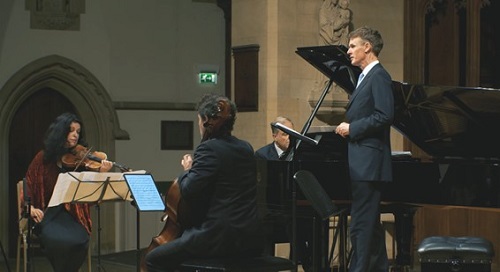
In his setting of Robert Burns’ ‘Farewell to the Highlands’ (originally for countertenor with organ accompaniment), Arvo Pärt adopted a more interventionist approach to the folk lyric, transforming the well-known text in a manner at once both simple and sophisticated. Joined by viola player Bryony Gibson-Cornish, the instrumentalists shared the elements of Pärt’s measured patterns and repetitions – dignified steps in the bass, deliberately placed pizzicatos, short strokes in the upper half of the bow carefully delineating vibrato-less ‘breaths’ – forming an intimate, evolving backdrop for Bostridge’s single-pitch ‘melody’. Bostridge made little attempt to colour the textual repetitions as the vocal line gradually rose through the notes of the tonic triad, allowing the tender harmonic grains which nestle within Pärt’s delicately shifting accompaniment to place his voice in relief. The vocal pitch was not always steady – perhaps the occasional slight ‘bends’ were deliberate? – but the restrained formality with which Bostridge presented the text’s quiet emotions assumed an almost mystical quality, set against the starkness of the softly glimmering, almost otherworldly, backdrop.
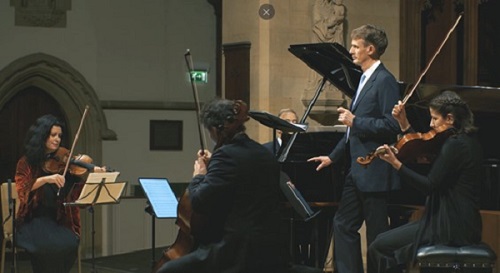
In the remainder of the recital Bostridge and Drake presented German lieder, beginning with four late Schubert settings of poems by Johann Gabriel Seidl. Drake’s urging bass line embodied the yearning for the absent beloved which fuels the poet-speaker’s creativity in ‘Sehnsucht’ (Longing), while Bostridge exploited the modulations to the major mode to convey the hope, captured in the gleam of a star, that shines through the clear, cold night, a freshness and energy imbuing his wondering, “Mein Lieb, wo weilst du nur so fern,/ Mein schöner Stern, mein Augenstern?” (My love, where are you, so far away, my fair star, my darling?). Small contrasts were expressive. The simple directness of the affirmation, “Du weisst, dich lieb’ und brauch’ ich ja” (You know that I love you and need you), made the shadows which fell upon the tears that welled up unbidden, “Die Träne tritt mir wieder nah”, all the more affecting. And, though the poet rejoices that distance creates a space in which song can flourish, Drake’s long delaying of the final resolution retrospectively tempered the confidence of Bostridge’s closing assertion, “Dann fühl’ ich, dass ich singen darf” (yet I feel I can still sing).
How beautifully Drake initiated the ceaseless semiquavers which pulse through ‘Im Freien’ (In the open), easing into the stream of sound and creating a sense of wonder at the flood of joy that accompanies the return home. Fusing relaxation and renewal, the duo created a moment of true peace and oneness, a man in harmony with his world. Bostridge’s tenor was at its most tender, swelling as the poet-speaker’s heart was filled with remembered happiness, “O wie oft mein Busen schwoll, Froher dort gestimmt!”, strengthening further as the treasures of the landscape were illuminated by beckoning moonbeams, softening once more with the decorative delicacy of true love. And, if it was with a tense restlessness that the traveller addressed the moon in ‘Der Wanderer an den Mond’, then by the close there seem to be some comfort in the moon’s untroubled certainties, assurance that happy is the man who, wherever he goes, stands on his native soil. Drake swirled through the racing triplets of the final Seidl setting, ‘Bei dir allein!’ (With you alone!), and Bostridge captured the intimacy, if not quite the rapture, of the poet-speaker’s experience in the grove with his beloved.
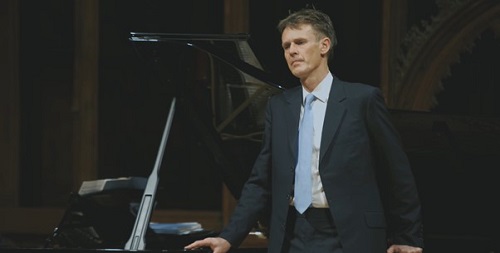
One of the real pleasures of live performances is hearing familiar works created, interpreted and re-interpreted, witnessing the expressive impact of the smallest choices made and nuances gestured, as musicians respond to each other ‘in the moment’. Here, the sense of absence that Drake’s wonderfully sculpted introduction to the first song of Schumann’s Dichterliebe, ‘Im wunderschönen Monat Mai’ (In the wondrous month of May) – each note placed like a precious jewel upon dark silk, sparkling but singular and separate – inspired deep pensiveness from Bostridge, who seemed during this opening song almost to slip ‘elsewhere’, perhaps to that time and place which exists only in the poet-speaker’s memory of a longing and desire confessed. Certainly, a very long silence followed the piano’s inconclusive circling. And, subsequent songs seemed to emphasise extremes and schisms between emotional states, the confined gentleness of ‘Aus meinen Tränen sprießen’ (From my tears there will spring) shattered by the over-excitement of ‘Die Rose, die Lilie, die Taube, die Sonne’ (Rose, Lily, Dove, Sun); the sincerity and certainty of the first stanza of ‘Wenn ich in deine Augen seh’ (When I look into your eyes) unsettled by the harmonic currents of the second, Bostridge’s bitter flattening of the dissonant twist, “Doch wenn du sprichst”, hinting at the poet’s delusion and making tangible the beloved’s imagined voice.
Tempi seemed responsive to the poems’ unfolding experiences, too. Just as the restraint of the first song established a sense of ‘remoteness’, a gap between absence and presence, lived and remembered, real and imagined, so the flood of rising arpeggios that ripples through the piano accompaniment to ‘Ich will meine Seele tauchen’ (Let me bathe my soul) seemed a little muted, held back, making the “wunderbar süsser Stund” (wondrously sweet hour) of memory less tangible, the lover’s kiss less true. And, ‘Im Rhein, im heiligen Strome’ (In the Rhine, in the holy river) which follows, felt similarly ‘burdened’, the taut dotted rhythms dissipating into listlessness, the piano’s accented bass notes not energised but angry, the image of Our Lady in Cologne’s grand cathedral offering no reassurance. No wonder that the poet’s subsequent protestations, “Ich grolle nicht” (I bear no grudge), dark, almost sneering at times, lacked conviction, overwhelmed by the fury with which Bostridge recalled the dream-image of the beloved, “Und sah die Schlang’, die dir am Herzen frisst” (and saw the serpent gnawing at your heart), and the pain pumping from the piano’s stabbing cadential chords.
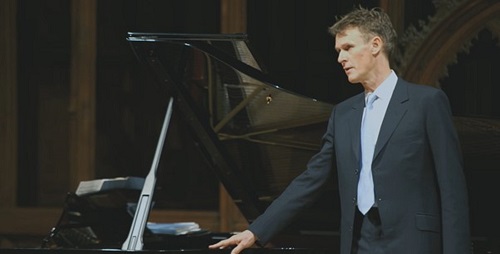
It was a pain which spilled segue into ‘Und wüßten’s die Blumen, die kleinen’ (If the little flowers knew) in which the poet, defences fallen, shares his grief with the flowers, the nightingales and the stars; and, it spun on, into the ironic whirls of the imagined wedding dance in ‘Das ist ein Flöten und Geigen’ (What a fluting, what a scraping), in which Drake emphasised the almost grotesque contrast between the ceaseless chromatic circling and the dry staccato stamping – a musical metaphor for Heine’s juxtaposition of nuptial piping and the sobbing and groaning of the ‘lovely little angels’ (“Dazwischen schluchzen und stöhnen/ Die lieblichen Engelein”). Another long silence followed, as if the very air needed cleansing. And, when the lover’s song was remembered, in ‘Hör’ ich das Liedchen klingen’, once more the languid tempo made the poet seem weighed down by a heartache made palpable, Bostridge enunciating the text with careful deliberation as if every syllable bore its own pain, and drawing out the song’s sole melodic decoration, “Dort löst sich auf in Tränen”, a harrowing inner writhing of a grief which, in Drake’s torturously unwinding postlude, dissolved in tears.
Bostridge fairly snarled his way through the faux-jolly jangling of ‘Ein Jüngling liebt ein Mädchen’ (A boy loves a girl), but contempt was immediately juxtaposed with vulnerability, the tenderly crafted phrases of ‘Am leuchtenden Sommermorgen’ (One bright summer morning) imbued with a dreaminess enhanced by Drake’s sensitive rhythmic manipulations which served to deepen the harmonic ambiguities of the song. Only when voicing the words with which the pitying flowers address the poet, “‘Sei unsrer Schwester nicht böse,/ Du trauriger, blasser Mann.’” (Be not angry with our sister, You sad, pale man), did Bostridge heighten the colour a little, the modal meanderings of the piano postlude accentuating the pathos of the image. ‘Ich hab’ im Traum geweinet’ (I wept in my dream) seemed almost choked with loneliness, voice and piano floating adrift, Bostridge’s tenor aching with tears dreamt and wept, Drake’s low splutterings dry and comfortless.
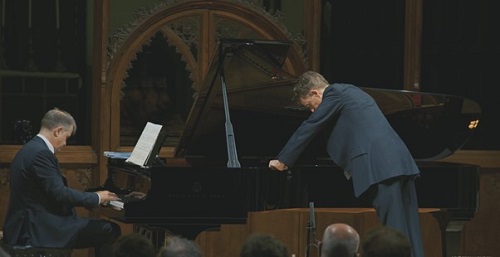
The throwaway lightness of the close of ‘Allnächtlich im Traume’ (Nightly in my dreams) was bitterly self-castigating, the beloved’s whispered word repeatedly forgotten with the coming of morn. Only in dreams and fairy-tales can the poet find renewal and joy, and, after the sprightly visions of natural splendour and freedom, in the final two stanzas of ‘Aus alten Märchen’ (From Fairy Tales of Old) Bostridge conveyed both the sincerity of the wish to journey to such blissful magic lands and, in the fading repetition of their dissolution, “Zerfliesst’s wie eitel Schaum” (It melts away like mere foam), the denial of possibility – a denial cruelly taunted by Drake’s carefree postlude. All that was left was to bury ‘the bad old songs’ (‘Die alten, bösen Lieder’) but bluster gave way to an honesty raw and aching with the poet’s final confession of despair, “Ich senkt’ auch meine Liebe/ Und meinen Schmerz hinein.” (I’d like to bury there my love, And my sorrow too.) The gorgeous piano postlude seemed not to salve and resolve but rather to pull Bostridge down into its sinking depths.
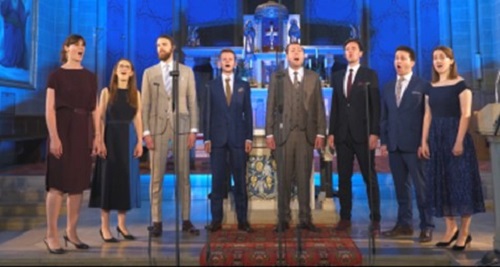
During this Live from London series VOCES8 are inviting viewers to join them on their summer tour, and here the ensemble’s musical preface, performed in the church of St Martinus in Hattersheim, was Heinrich Schütz’s ‘Selig sind di Toten’ (Blessed are the departed), which sets the same biblical text as that with which Brahms concludes his German Requiem. Luxuriant of tone and sung with discerning clarity and evident affection, Schütz’s motet roved through its emotive harmonies driven by an inner light of spiritual comfort.
This concert is available on demand until the end of Sunday 18th September.
Claire Seymour
Ian Bostridge (tenor), Julius Drake (piano), Priya Mitchell (violin), Bryony Gibson-Cornish (viola), Brian O’Kane (cello)
Beethoven – Three Irish songs (‘O! who, my dear Dermot (Avenging and Bright)’, ‘The return to Ulster’, ‘Come draw we round a cheerful ring’); Pärt – ‘My heart’s in the highlands’; Schubert – Four Seidl songs (‘Sehnsucht’, ‘Im Freien’, ‘Der Wanderer an den Mond’, ‘Bei dir Allein!’); Schumann –Dichterliebe
Performed at St John the Evangelist Church, Oxford on Tuesday 28th September 2021. Filmed by VOCES8 Studios and streamed Monday 1st August 2022.